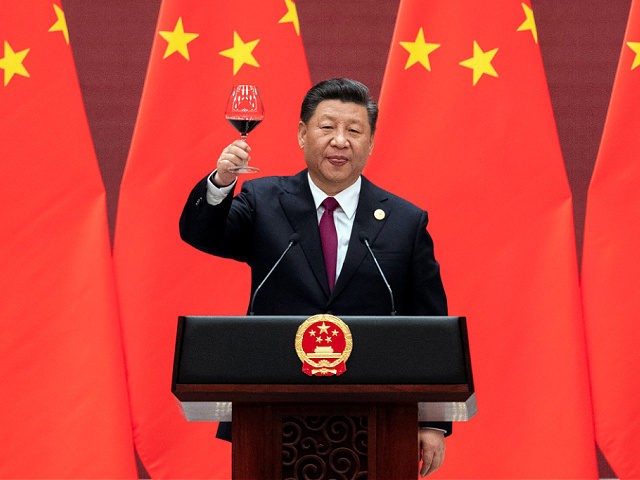China’s government-run Global Times newspaper praised dictator Xi Jinping for being the “best spokesperson for Chinese cuisine,” a bizarre role for the president of a country to take in light of his total lack of leadership in encouraging citizens to get coronavirus vaccines.
Xi is one of the few leaders of major world powers not to either televise himself receiving a vaccine against the Chinese coronavirus or state that he had received one. Leaders like President Joe Biden, President Andrés Manuel López Obrador of Mexico, Prime Minister Narendra Modi of India, Israeli Prime Minister Benjamin Netanyahu, and Saudi King Salman have all posted either photos or videos receiving doses of Chinese coronavirus vaccines, among others. The intent of the move is to inspire confidence in the inoculation products and encourage citizens to receive them, theoretically bringing the nations closer to herd immunity. Even those who have not received a vaccine in front of cameras, like Russian leader Vladimir Putin, have at least claimed to do so privately.
No public information regarding Xi Jinping’s vaccination status is available at press time. Xi is 67 years old, placing him in one of the highest-risk groups for coronavirus complications: senior citizens. The Chinese Foreign Ministry has refused to answer if the dictator has received any vaccine doses in the past but not addressed the issue recently. Xi has made several public appearances without wearing a sanitary mask despite being in crowded, indoors events, suggesting to some that he may be protected by inoculation.
Xi has played no role in any national campaign to encourage Chinese people to get vaccinated.
He has, however, enthusiastically endorsed eating “river snail rice noodles,” a local fixture in Guangxi province.
“Xi visited a food-processing zone for luosifen [river sail] rice noodles during his inspection of Liuzhou [Guangxi] on Monday,” the Global Times noted Tuesday. “Xi said that it’s not an easy task to develop the small rice noodle business into such a large industry.”
“Luosifen, a local specialty of Liuzhou, South China’s Guangxi Zhuang Autonomous Region, was just one of a number of local Chinese delicacies that shot to fame after getting the thumbs-up from Chinese President Xi Jinping,” the propaganda outlet noted. Xi, it went on, is dedicating his time to promoting various obscure dishes like the rice noodles, known for their “pungent odor.”
Xi reportedly prompted similar popularity for street snacks from Shaxian, part of Fujian province, some weeks ago, and also reportedly helped boost a “local specialty fungus” in Shaanxi.
Xi’s fixation with bizarre Chinese foods made the people feel that he “really cares about people’s livelihoods,” the Global Times noted, citing government-approved comments on Chinese social media networks. The emphasis on how Xi is spending his time during a pandemic that Chinese experts say will not end without mass vaccination highlights the void he has left in leadership on the country’s vaccination drive, particularly in light of his own regime dismissing Chinese-made coronavirus vaccines as not especially effective.
“It’s now under formal consideration whether we should use different vaccines from different technical lines for the immunization process,” Gao Fu, the director of China’s Center for Disease Control (CDC), said in April. “Everyone should consider the benefits mRNA vaccines can bring for humanity. We must follow it carefully and not ignore it just because we already have several types of vaccines already.”
China has not yet produced a coronavirus vaccine depending on novel mRNA technology. Only two pharmaceutical companies — American firms Pfizer and Moderna — have released mRNA coronavirus vaccines currently in widespread use. Gao noted China’s five homemade vaccine candidates “don’t have very high protection rates” in the same public appearance.
While Gao personally clarified that any quotes from that event by him were a “complete misunderstanding,” and China announced it would soon begin to import Pfizer vaccine doses, Xi Jinping did not personally defend Chinese-made vaccines or issue a comment to the public urging them to be vaccinated. Xi also did not weigh in after Zhong Nanshan, his top respiratory disease expert, warned in March that too few people in China were receiving vaccine doses, meaning China would soon lag behind in herd immunity compared to other large states.
“If China continues with such a low vaccination rate, it will not keep up. There’s a possibility that in the future, other countries will have [herd immunity] but China doesn’t,” Zhong warned. Zhong attributed the relatively low vaccination rates to Xi’s regime giving the impression that China had overcome the pandemic and the Chinese coronavirus was no longer a threat.
Some local Communist Party officials have attempted to entice people into signing up for vaccine candidate doses by threatening to publish “blacklists” of individuals who refused the shots when their turn came up. Others attempted to offer free ice cream or groceries, taking the opposite approach. Beijing, through its state media arms, has appeared to prefer the positive approach without enacting any policies or initiatives at the national level to support vaccination drives.

COMMENTS
Please let us know if you're having issues with commenting.